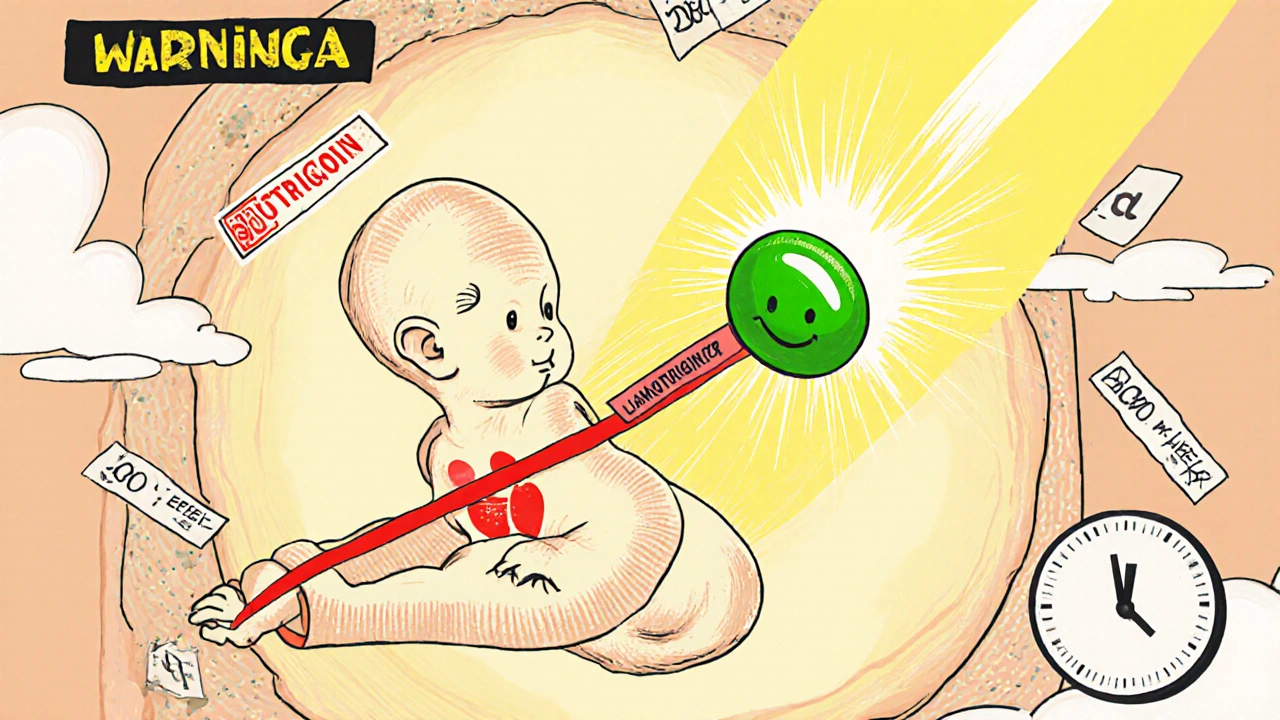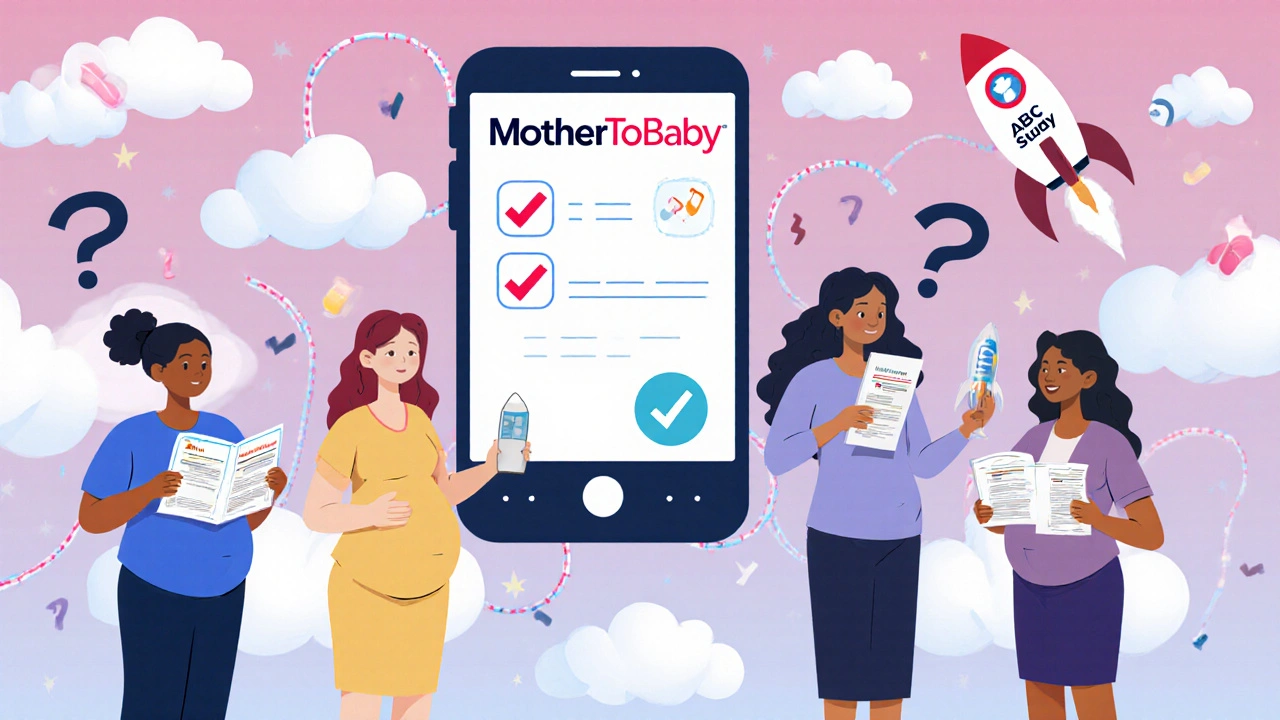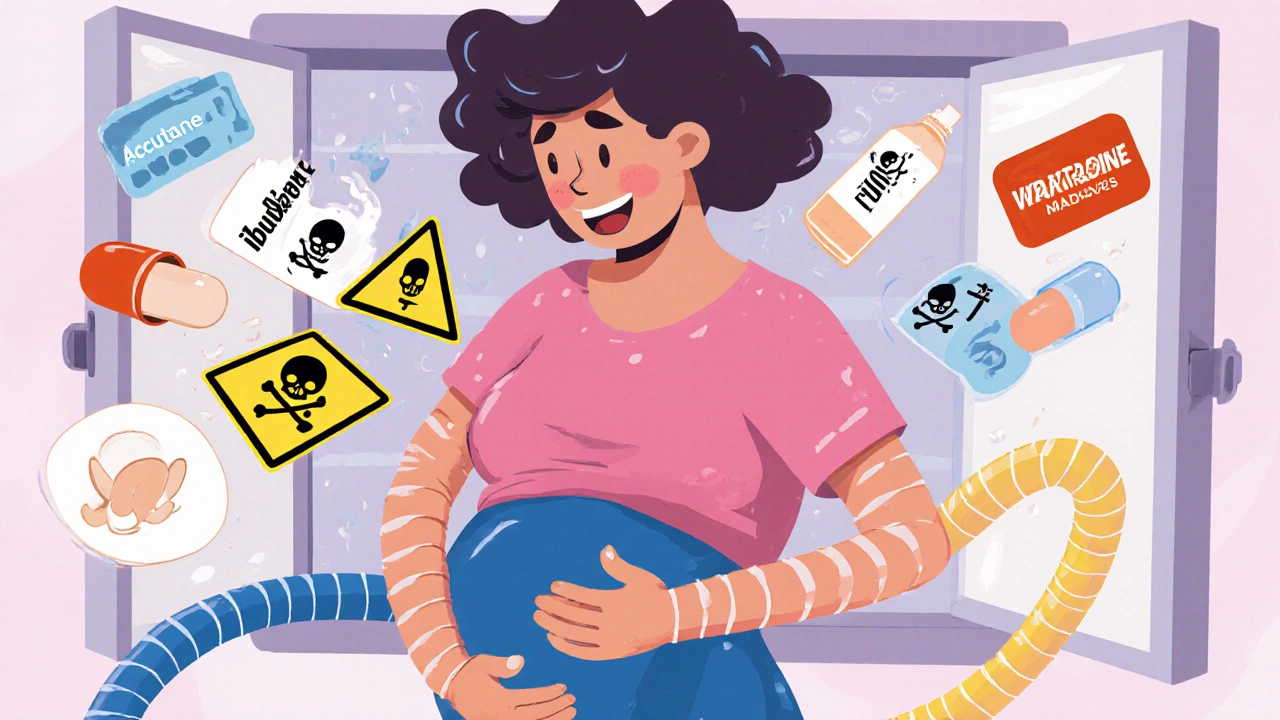When you’re pregnant, every pill, drop, or supplement feels like a decision that could change your baby’s life. You’re not just thinking about yourself anymore. That headache? That stuffy nose? That back pain? It’s tempting to reach for what’s worked before-Advil, Tylenol, Sudafed-but what if those are riskier than you thought? The truth is, many common medications you’ve used without a second thought can harm your developing baby, especially during the first trimester when organs are forming. And it’s not just prescription drugs-over-the-counter meds, herbal supplements, and even some acne treatments carry serious risks you might not know about.
Drugs That Can Cause Birth Defects
Some medications are outright dangerous during pregnancy. Isotretinoin, the powerful acne drug sold as Accutane, is one of the worst offenders. It doesn’t just increase the chance of a birth defect-it causes them. More than 25% of babies exposed to isotretinoin in early pregnancy develop severe abnormalities, including missing ears, heart defects, and brain malformations. That’s why the FDA’s iPLEDGE program requires strict controls before it’s even prescribed. If you’re planning pregnancy, stop this drug at least one month before trying to conceive-and use two forms of birth control while taking it.
ACE inhibitors and ARBs, used for high blood pressure, are another red flag. Drugs like lisinopril, enalapril, and valsartan can cause kidney failure in the fetus, low amniotic fluid, and even death. If you’re on one of these and find out you’re pregnant, don’t panic-but don’t wait either. Talk to your doctor immediately. There are safer alternatives like methyldopa or labetalol that won’t cross the placenta the same way.
Warfarin, a blood thinner, is also risky. It crosses the placenta and can cause fetal warfarin syndrome, which includes facial deformities, bone problems, and developmental delays. If you need blood thinning during pregnancy, your doctor will switch you to heparin or enoxaparin (Lovenox), which don’t cross the placenta and are much safer.
Valproic acid, used for epilepsy and bipolar disorder, carries a 10.7% risk of major birth defects-nearly four times higher than the general population. Babies exposed to it are more likely to have spina bifida, cleft palate, heart issues, and lower IQ scores. If you have epilepsy and are planning pregnancy, talk to your neurologist about switching to lamotrigine or levetiracetam, which have far better safety records.
NSAIDs: More Dangerous Than You Think
Ibuprofen (Advil, Motrin), naproxen (Aleve), and other NSAIDs are often seen as harmless, especially since they’re sold next to candy at the pharmacy. But the FDA issued a strong warning in 2020: don’t use them after 20 weeks of pregnancy. Why? Because they can shut down a critical blood vessel in the baby’s kidneys, leading to low amniotic fluid (oligohydramnios) and kidney failure. This isn’t a rare side effect-it happens in 1.5 to 2 times more pregnancies when NSAIDs are used late in pregnancy.
Even aspirin is risky unless it’s a low dose (60-150 mg) prescribed specifically to prevent preeclampsia. Regular-strength aspirin can interfere with labor, increase bleeding risk, and harm the baby’s heart. If you’ve been taking ibuprofen for back pain or headaches, stop now-and talk to your provider about what to use instead.

The Acetaminophen Controversy
For decades, acetaminophen (Tylenol) was the gold standard for pain and fever during pregnancy. But new research is turning that belief upside down. A 2021 study in JAMA Pediatrics followed 95,000 mother-child pairs and found a 28.6% higher risk of ADHD and a 20.4% higher risk of autism spectrum disorder in children whose mothers took acetaminophen for long periods during pregnancy. The FDA issued a notice on September 22, 2025, advising doctors to recommend acetaminophen only when necessary-and to avoid routine use for mild symptoms like low-grade fevers or occasional headaches.
But here’s the catch: untreated fever above 102°F can raise the risk of neural tube defects by 8.2 times. So if you have a high fever, the danger of not treating it may be worse than the risk of acetaminophen. The key is timing and dose. Use the lowest amount possible for the shortest time. Stick to 325-650 mg every 4-6 hours, and never exceed 3,000 mg per day. If you’ve been taking Tylenol daily for weeks, talk to your doctor about why and whether there’s a better way to manage your symptoms.
Safe Alternatives for Common Ailments
You don’t have to suffer through pregnancy discomforts without relief. There are safer options for nearly every common issue.
- Pain and fever: Acetaminophen remains the best choice when used carefully. Avoid NSAIDs completely after 20 weeks.
- Allergies: Loratadine (Claritin), cetirizine (Zyrtec), and fexofenadine (Allegra) are all Category B, meaning they’ve been studied in hundreds of pregnant women with no increased risk of birth defects. The MotherToBaby registry confirms safety in over 2,000 cases.
- Nasal congestion: Start with saline sprays and humidifiers. If you need something stronger, pseudoephedrine (Sudafed) is okay after the first trimester, but only at 30-60 mg every 4-6 hours, not more than 120 mg per day. Avoid it if you have high blood pressure-it can raise it by 5-10 mmHg.
- Constipation: Fiber and water are your first line of defense. Aim for 25-30 grams of fiber daily. If that’s not enough, docusate sodium (Colace) at 100 mg twice daily or polyethylene glycol (Miralax) at 17g daily are both Category B and safe in over 700 documented pregnancies.
- Depression and anxiety: Untreated depression increases the risk of preterm birth by 64% and low birth weight by 73%. Paroxetine (Paxil) should be avoided because of its link to heart defects, but other SSRIs like sertraline (Zoloft) have better safety data. The key is not stopping medication abruptly-work with your mental health provider to find the safest option for you and your baby.

What You Need to Do Right Now
If you’re pregnant or planning to be, here’s what to do immediately:
- Make a full list of everything you take: prescriptions, OTC meds, vitamins, herbs, and supplements. Include doses and how often you take them.
- Don’t stop anything cold turkey-especially antidepressants, seizure meds, or blood pressure drugs. Talk to your doctor first. Stopping suddenly can be more dangerous than continuing.
- Use trusted resources like MotherToBaby (a service run by the Organization of Teratology Information Specialists). They offer free, evidence-based advice and have answered over 2.3 million pregnancy medication questions annually.
- Ask about preconception counseling if you have a chronic condition like epilepsy, diabetes, or depression. Switching to safer meds before pregnancy gives your body time to adjust and reduces risks.
- Check labels for pregnancy warnings. The FDA’s Pregnancy and Lactation Labeling Rule (PLLR) replaced the old A, B, C, D, X categories in 2015. Now, drug labels include detailed sections on risks, data, and recommendations.
What’s Changing in 2025 and Beyond
The landscape is shifting fast. The FDA’s 2025 notice on acetaminophen marks a turning point. It’s no longer a simple ‘safe’ label-it’s a cautionary one. The CDC updated its website in 2023 to reflect this, adding warnings about long-term use. Meanwhile, lawsuits are mounting: over 100 have been filed against acetaminophen manufacturers for failing to warn about neurodevelopmental risks. The first major trial is set for March 2024.
Research is also moving forward. The multinational Acetaminophen Birth Cohort Study (ABC Study) has enrolled 50,000 pregnant women across 15 countries and will track their children’s development until age 10. Results are expected by late 2025. Until then, the safest approach is caution: use the least amount of medication for the shortest time possible.
For now, the message is clear: don’t assume anything is safe just because it’s sold over the counter. Every medication has a story-and in pregnancy, that story can affect your child’s life for decades.
Is it safe to take Tylenol while pregnant?
Acetaminophen (Tylenol) is still the preferred pain reliever during pregnancy when used at the lowest effective dose for the shortest time possible. However, new evidence suggests prolonged or frequent use may be linked to higher risks of ADHD and autism in children. Avoid daily use unless medically necessary. Stick to 325-650 mg every 4-6 hours, and never exceed 3,000 mg per day. If you’re using it for a low-grade fever or mild headache, try rest, hydration, or a cold compress first.
Can I take ibuprofen during pregnancy?
No-avoid ibuprofen and other NSAIDs after 20 weeks of pregnancy. They can cause serious problems like reduced amniotic fluid and fetal kidney damage. Even before 20 weeks, it’s best to avoid them unless your doctor specifically recommends them for a medical reason. For pain relief, use acetaminophen instead. If you took ibuprofen early in pregnancy, don’t panic-most babies are fine, but talk to your provider to assess any potential risks.
What’s the safest allergy medicine during pregnancy?
Loratadine (Claritin), cetirizine (Zyrtec), and fexofenadine (Allegra) are all considered safe during pregnancy. These second-generation antihistamines have been studied in thousands of pregnant women with no increased risk of birth defects. Avoid first-generation antihistamines like diphenhydramine (Benadryl) if possible-they can cause drowsiness and may affect fetal movement. Always check with your doctor before starting any new medication, even if it’s available without a prescription.
Is it safe to take antidepressants while pregnant?
Untreated depression carries serious risks, including preterm birth and low birth weight. Some antidepressants, like paroxetine (Paxil), are linked to heart defects and should be avoided. But others, like sertraline (Zoloft) and citalopram (Celexa), have strong safety data. The decision isn’t about avoiding medication entirely-it’s about choosing the right one. Work with your OB-GYN and mental health provider to find the safest option. Never stop your medication suddenly; tapering under medical supervision is essential.
What should I do if I took a risky medication before knowing I was pregnant?
First, don’t panic. Many women take medications before realizing they’re pregnant, and most babies are born healthy. Write down the name of the medication, when you took it, and for how long. Contact MotherToBaby or your OB-GYN-they can assess your specific situation using the latest data. Most risks are dose- and timing-dependent. For example, taking isotretinoin even once in early pregnancy carries a high risk, but a single dose of ibuprofen before week 20 is unlikely to cause harm. Getting expert advice is the best next step.
 Nov, 21 2025
Nov, 21 2025

Ross Ruprecht
November 22, 2025 AT 18:15Bryson Carroll
November 23, 2025 AT 16:13Lisa Lee
November 25, 2025 AT 13:31Jennifer Shannon
November 26, 2025 AT 00:23Suzan Wanjiru
November 27, 2025 AT 19:47Kezia Katherine Lewis
November 28, 2025 AT 19:29Henrik Stacke
November 30, 2025 AT 14:57Manjistha Roy
December 1, 2025 AT 00:54Jennifer Skolney
December 2, 2025 AT 16:44JD Mette
December 4, 2025 AT 05:27Olanrewaju Jeph
December 4, 2025 AT 21:45Dalton Adams
December 5, 2025 AT 23:26Kane Ren
December 6, 2025 AT 05:36Charmaine Barcelon
December 6, 2025 AT 18:22Ross Ruprecht
December 7, 2025 AT 17:29